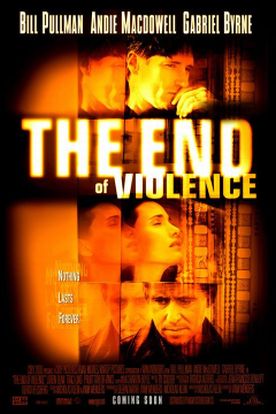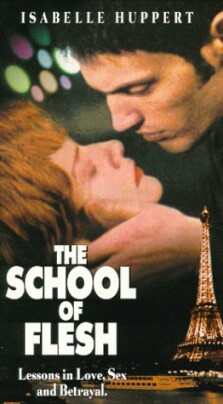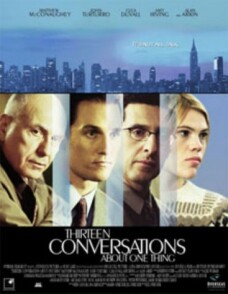End of Violence, The
The End of Violence, directed by Wim Wenders and written by Nicholas Klein is a frequently enjoyable film in which, however, there is far too much going on, an excess of Germanic portentousness and a hackneyed narrative premiss involving a vast governmental conspiracy (ho-hum) against the people. On the symbolic level the film is about living with Big Brother peering over your shoulder, about such accommodations as are possible with a well-intentioned but still ruthless Big Brother, and about learning to be human in spite of the temptations of Hollywood-style success. On the more literal level, it is about two central figures whose lives are intertwined but who never meet. One is a swine of a film producer (Creative Killing, Odd Sudden Death) called Mike Max (Bill Pullman), who is married to and dominates the weak and languid Page (Andie MacDowell) and who suddenly disappears one day, kidnapped by unknown parties.
The parallel story is of a top-secret government surveillance operation manned by Ray Baring (Gabriel Byrne). Ray sits in an observatory in the California hills and watches people instead of stars. The technology is not wildly out of line with what now actually exists (no 1984– style telescreens), but Ray’s motives, like his employers, remain obscure. He seems to be merely a paid functionary who goes home at night—often very late at night—to look after an aged father, and who strikes up a friendship with the observatory’s Hispanic cleaning woman and her young daughter.
For a long time it is not clear what these two stories have to do with each other. We are simply presented with a series of vignettes, some of Ray’s surveillance but mostly from Max’s life and kidnapping—though there is also a voiceover narration by Max to fill in some background. He tells us he loved and was terrified by movies as a child. They inspired him with thoughts of the dangers around him, including invasion by aliens. That’s why he got into movies, “turning fear of strangers into a multimillion dollar industry. . .Paranoia is our number one export. Everybody needs an enemy. . . Now I came to realize there were no extras or strangers, just a strange world.”
He is kidnapped while talking on his cell phone to his wife, who has just threatened in a rather inconsequential way to leave him and go to Guatemala ( “Have you an appetite for squalor?” he asks her).The next time we see him, he is kneeling at an isolated spot near the freeway with his hands and feet bound with duct tape and two comic killers talking about killing him. One says that he doesn’t want to. He’s come to like him, and he’s said some rather interesting things, such as that a kidnapper like him ought to have a future in the entertainment business. The other one keeps urging him to kill him. “We kill him, we leave plus the Mercedes. We don’t kill him, we die—minus the Mercedes. What’s it going to be?” Max tries to buy them off. “I want to give you a million bucks in points.” But they don’t know what points are.
Cut to a poetry club attended by Cat (Traci Lind), a stunt woman on Max’s current picture whom he had been visiting in hospital after an accident on the set just before he was kidnapped. When she said she wasn’t going to sue him anyway, she had instantly earned his trust. Now, in the poetry club, a black poetess is reciting a poem about childhood rape whose refrain is “I don’t want to die.” Cut to the cops looking at the headless corpses of the two killers the next morning. There is no sign of Max. It looks like he broke loose and shot them before they could shoot him, but one cop has a theory that military ammunition from 300 yards could have produced the same result as a shotgun at close range on the two would-be killers. We also know that the scene between Max and the killers showed up on Ray’s surveillance equipment.
Cut to some Mexican gardeners finding Max unconscious in the bushes. For unknown reasons, he asks them to take him home with them instead of to the hospital. Chief among them is Ramon (Enrique Castillo). They agree. He joins an extended Mexican family almost as one of them. He rediscovers real life, regrets his treatment of his wife and learns not to be a swine anymore. But he can’t go home because he knows that the feds are watching his house. Also, Page has blossomed in his absence and is learning to be the same sort of swine he was. He learns of the attempted delivery of an FBI file from a man he once met casually at a technology conference. It is Ray. At last the two stories come together. Ray’s surveillance project is part of a well-intended but still secret government project to bring about an “end of violence,” but Ray, disturbed by the civil liberties implications, wants to tell somebody on the outside.
When I tell you that Daniel Benzali plays Ray’s nameless superior, and that he doesn’t want anyone on the outside to know about the project, for fear of jeopardizing congressional approval, you can pretty much guess the rest. The feds already know everything, and the only question is whom are they going to have to kill in order to protect the end-of-violence project.The ironies are nice, and there is a lovely scene between Max and Page, itself worth the price of admission, where they have changed places—she well on her way to Hollywood swinedom and he on his way to some twilight zone without money or fame but away from the cameras of power.
Yet somehow, perhaps because of what is by now the overfamiliar paranoic landscape, the movie seemed to me a little lacking in heart, or emotional firepower. Max’s voiceover summing up refers back back to his childhood paranoia: “I became the enemy. And when the enemy I’d expected finally came, they set me free. Strange.” Lucky for him, then! But is that all there is to say in the end about what purports to be a nightmarish glimpse into the realities of power in the late twentieth century? Then why bother with it?
Discover more from James Bowman
Subscribe to get the latest posts to your email.






